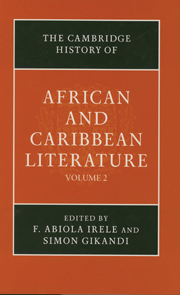Book contents
- Frontmatter
- 23 East African literature in English
- 24 Anglophone literature of Central Africa
- 25 West African literature in English: beginnings to the mid-seventies
- 26 South African literature in English
- 27 African literature in French: sub-Saharan Africa during the colonial period
- 28 North African literature in French
- 29 Francophone literatures of the Indian Ocean
- 30 African literature in Spanish
- 31 African literature in Portuguese
- 32 Popular literature in Africa
- 33 Caribbean literature in French: origins and development
- 34 Caribbean literature in Spanish
- 35 Anglophone Caribbean literature
- 36 The Harlem Renaissance and the Negritude movement
- 37 Postcolonial Caribbean identities
- 38 African literature and post-independence disillusionment
- 39 “Postcolonial” African and Caribbean literature
- 40 Modernism and Postmodernism in African literature
- Index
- References
40 - Modernism and Postmodernism in African literature
Published online by Cambridge University Press: 28 March 2008
- Frontmatter
- 23 East African literature in English
- 24 Anglophone literature of Central Africa
- 25 West African literature in English: beginnings to the mid-seventies
- 26 South African literature in English
- 27 African literature in French: sub-Saharan Africa during the colonial period
- 28 North African literature in French
- 29 Francophone literatures of the Indian Ocean
- 30 African literature in Spanish
- 31 African literature in Portuguese
- 32 Popular literature in Africa
- 33 Caribbean literature in French: origins and development
- 34 Caribbean literature in Spanish
- 35 Anglophone Caribbean literature
- 36 The Harlem Renaissance and the Negritude movement
- 37 Postcolonial Caribbean identities
- 38 African literature and post-independence disillusionment
- 39 “Postcolonial” African and Caribbean literature
- 40 Modernism and Postmodernism in African literature
- Index
- References
Summary
It is not insignificant that Chinua Achebe, recognized as one of the world’s best contemporary novelists, gestures towards a Modernist sensibility in the title to his first novel, Things Fall Apart (1958). This refers to a line from W. B. Yeats’s “The Second Coming” (1922), in which, writing via an apocalyptic lens, the Irish poet describes the historical disruptions that occur in the encounter between epochs:
Turning and turning in the widening gyre
The falcon cannot hear the falconer;
Things fall apart; the center cannot hold;
Mere anarchy is loosed upon the world,
The blood-dimmed tide is loosed, and everywhere
The ceremony of innocence is drowned;
The best lack all convictions, while the worst
Are full of passionate intensity.
Achebe’s novel also reflects upon this theme but from a thoroughly African and Igbo perspective in which all levels of the narrative discourse, from language use to characterization and the sense of spatiality, help establish the terrible effects of the colonial encounter. Another of his novels, No Longer at Ease (1961), also refers to a Modernist poem, this time T. S. Eliot’s “Journey of the Magi” (1927). Eliot’s idea of being neither within nor outside the possibility of salvation, of being both of the old order and of the new, and the nagging sense of loss and alienation that this produces is translated by Achebe into a representation of the predicament of Obi Okonkwo, an educated African in early post-independence Nigeria caught between the mores and expectations of his traditional upbringing and the western forms of self-actualization sharpened by his travels in the west and by his sojourn in Lagos as a senior civil servant.
- Type
- Chapter
- Information
- The Cambridge History of African and Caribbean Literature , pp. 824 - 852Publisher: Cambridge University PressPrint publication year: 2000



